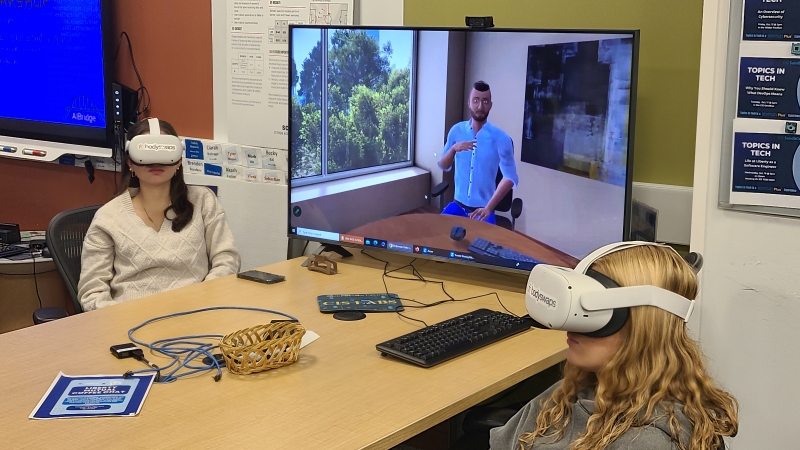
Hands-On High Tech: Students Take the Lead on Immersive Learning with Meta’s University Program
A campus fixture since 2011, the CIS Sandbox is a technology social learning space best known for its comprehensive peer-led tutoring services and long-running “Topics in Tech” speaker series, which features Bentley alumni sharing industry expertise. The CIS Sandbox also engages with external partners to explore cutting-edge technologies — as was the case this fall, when six student tutors partnered with Meta to evaluate the potential of immersive learning programs utilizing virtual reality (VR).
Bentley was one of just 15 universities in the nation to participate in Meta’s U.S. University Program — and, as Mark Frydenberg, the CIS Sandbox’s founding director and a Distinguished Lecturer in Computer Information Systems (CIS), proudly notes, “our students managed the entire process from start to finish.” Meta provided each program partner with Quest 2 VR headsets and supporting software, as well as access to immersive learning modules from Bodyswaps, a U.K.-based company that helps users develop their soft skills — such as interviewing skills, conflict resolution and inclusive leadership — through fully immersive VR simulations.
“It was important to me that our students took the lead on this project,” Frydenberg explains. “Beyond hands-on experience with VR technology, it was a great opportunity for them to further develop their project management and communication skills.” He tapped CIS Sandbox tutors Andre Noonan ’25, an Information Technology in Accounting major, and Vincent Paratore ’26, a student in Bentley’s Honors Program majoring in both Economics and Artificial Intelligence, to lead the program, as both had previous experience using Meta’s Quest 2 headsets.
“My responsibilities included setting up the headsets, configuring the device management software, teaching other tutors how to use the learning modules and scheduling all of the testing sessions,” says Paratore, noting that 150 Bentley students, faculty and staff from across the campus community participated in the CIS Sandbox trainings during a two-week period. “Although we used the Bodyswaps modules in our testing, we weren’t only evaluating the program itself. Rather, we considered our sessions as proof of concept for VR applications in learning-based environments.”

On that point, the Meta partnership proved a success. Most participants enjoyed the experience of VR, Paratore says, though they noted that the modules’ applicability might vary across disciplines. “A recurring theme among testers was the importance of making the VR learning module relevant to the course it would be used in,” he elaborates. “For example, many students felt the career readiness modules enhanced what they’d learned in their CDI classes,” or Career Design seminars, a series of six-week courses offered by the Pulsifer Career Development Center that help students develop the knowledge and skills they’ll need to succeed in the workplace.
For Frydenberg, a primary goal of the project was to increase awareness among the campus community of the value of VR as an educational tool. He notes that several faculty members who participated in the sessions were inspired to include Bodyswaps modules on bias and identity in Falcon Discovery Seminars (FDS)— three-credit required courses for first-year Bentley students — they taught this spring. As Aaron Ancell, an assistant professor of Philosophy, shares, “My FDS students found it very interesting to step into the (virtual) shoes of another person and experience the world from their perspective.”

As Frydenberg sees it, “Exposing Bentley students and faculty to this technology is important for two reasons. First, a fully immersive, 360-degree digital experience offers a new dimension for understanding complex topics in ways that can’t be taught through a textbook.” This view is bolstered by recent studies that indicate that VR experiences increase student engagement and enhance learning outcomes. “And second, VR technology is something our students are increasingly likely to encounter in the workplace — and gaining experience with it now gives them a competitive edge.”
Paratore agrees, noting that his experience co-leading the project helped him successfully land a position as a technology consulting intern at Deloitte this semester. He’s grateful for the opportunities Bentley provides — in the classroom, the CIS Sandbox and other campus learning spaces, such as the Lab for Economics, Accounting and Finance (LEAF) and the User Experience Center (UXC) — to facilitate a deeper awareness of how technological innovation drives business success.
“It’s challenging, because technology develops at such a rapid pace that professors are often teaching it to students before there is a standardized curriculum,” Paratore observes. “But between our classes, including new majors in FinTech and AI, and offerings from various labs and centers, I think Bentley is doing a good job making sure students have opportunities to engage, in real-time, with innovative and emerging technologies.”

